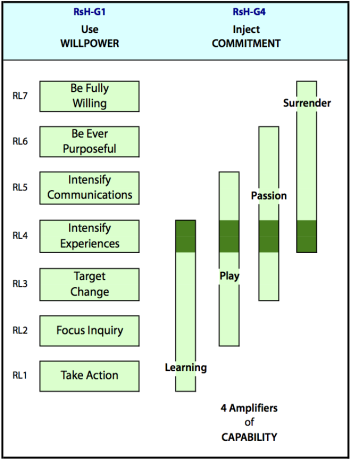Commit Your Self: RsH-G4
Maximize Identification
gets things moving—but it does not usually keep them moving in the way required. However much support you gain, the challenging project is yours and yours alone, and any external support places further expectations and demands on you. The project therefore needs proper . Becoming personally committed is an inner process, not a sudden event. It depends on consciously (and unconsciously) you identify with the challenge. You have the final say in whether or not you , into something. This makes it yours in a way that is more profound than involvement with its pressure to be sensible, and more enduring than enthusiasm with its poorly controlled ebbs and flows.

needs to be reflective, and therefore chosen self-consciously and openly channeled into the project. The «reflective» quality is provided by adding a 4th adjacent Level of and creating 4 Tetrads: as follows:
- :
- :
- :
- :
The function of is to ensure that you discover, develop and apply your relevant inner strengths to the project. One consequence is that you need to accept implications and unexpected ramifications of the project that may be onerous or unwelcome e.g. your external resources, like money and property, may also need to be provided.
The diagram shows that the requirement to occurs in all four Tetrads. This is the basis for personalizing the challenge. The internal Level varies in each Tetrad, with the result that should be:
- meaningful in
- sensible in
- shrewd in
- reflective in
Ways to Intensify Experience
RG44: Surrender
Entering a mental state of to the project depends on meaningfully associated with it. In this state, you put yourself wholly in the service of the . You will then discover what it is all about.
Outsiders' View: If supporters, they will welcome your ; if not, they may regard you as eccentric, obsessive or gullible.
RG43: Passion
Becoming about your project means caring intensely about its progress. It occurs by , but this must be sensible, not self-indulgent. adds an overt personal force to addressing issues and obstacles and has a marked, but diffuse, impact on others.
Outsider's View: Supporters will be delighted at your energy and involvement and may expect it. Others, however, may regard you as blinded or fanatical.
RG42: Play
is important because it opens the imagination and safely releases new intuitions, ideas and perspectives that may be relevant to the . requires that you shrewdly, so that nothing untoward occurs while conceptual and social ideas are tossed about.
Outsiders' View: Enlightened supporters realize that energizes you, lightens atmospheres, reduces negativity, and frees up the imagination. Some might even say that is the basic mode of learning. Others may view any joking and games during work (unless tightly structured and paid for) as evidence of flippancy, irresponsibility or immaturity.
RG41: Learning
here refers to learning by experience i.e. extracting and retaining practical knowledge from both successes and failures. something necessary for your project requires you to reflectively so that relevant knowledge sticks as you strive, inquire, fail and succeed. typically demand a broadening of perspectives and a deepening of knowledge, often in areas not evident at the outset. So includes reading and discussing, but reflection needs to follow to increase the pertinence of the ideas.
Outsiders' View: Supporters may not understand what or why you need to , and the culture probably determines if they welcome it. Some may regard you as wasting time in looking backwards or attending conferences.
- Now examine the internal structure in more detail.
OR
- Continue to the next ingredient: perseverance.
Originally posted: 31-Jan-2012. Last updated 27-Jan-2013.